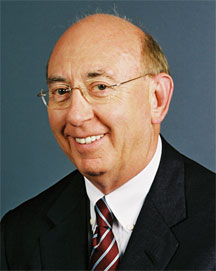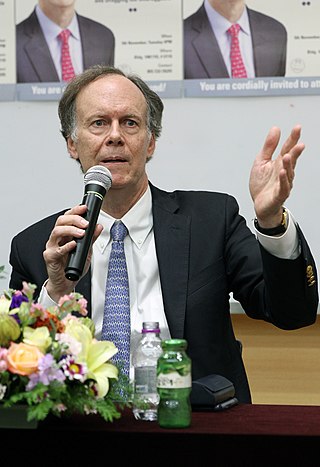
The Johns Hopkins University School of Medicine (JHUSOM) is the medical school of Johns Hopkins University, a private research university in Baltimore, Maryland. Founded in 1893, the School of Medicine shares a campus with Johns Hopkins Hospital and Johns Hopkins Children's Center, established in 1889.
Daniel F. Roses is an American surgeon who is the Jules Leonard Whitehill Professor of Surgery and Oncology of the New York University School of Medicine and a Senior Attending Surgeon at Tisch Hospital of the New York University Medical Center.

David B. Agus is an American physician, cancer researcher and author who serves as a professor of medicine and engineering at the University of Southern California Keck School of Medicine and Viterbi School of Engineering and the Founding Director and CEO of the Lawrence J. Ellison Institute for Transformative Medicine. He is also the cofounder of several personalized medicine companies and a contributor to CBS News on health topics. He is also the author of four books.
James L. Gulley is an American cancer researcher and the Director of the Medical Oncology Service at National Cancer Institute.

John E. Niederhuber was the 13th director of the National Cancer Institute (NCI), from 2006 until July, 2010, succeeding Andrew von Eschenbach, who went on to become a director at biotechnology firm BioTime. A nationally renowned surgeon and researcher, Dr. Niederhuber has dedicated his four-decade career to the treatment and study of cancer - as a professor, cancer center director, National Cancer Advisory Board chair, external advisor to the NCI, grant reviewer, and laboratory investigator supported by NCI and the National Institutes of Health. He is now Executive Vice President/CEO Inova Translational Medicine Institute and Inova Health System and co-director, Johns Hopkins Clinical Research Network.

Charles L. Sawyers is a Howard Hughes Medical Institute (HHMI) investigator who holds the Marie-Josée and Henry R. Kravis Chair of the Human Oncology and Pathogenesis Program (HOPP) at Memorial Sloan Kettering Cancer Center (MSK). HOPP is a program created in 2006 that comprises researchers from many disciplines to bridge clinical and laboratory discoveries.
Otis Webb Brawley is an American physician and the Bloomberg Distinguished Professor of Oncology and Epidemiology at Johns Hopkins University. He served as Chief Medical and Scientific Officer and Executive Vice President of the American Cancer Society from July 2007 to November 2018. He is board certified in internal medicine and medical oncology and is a Master of the American College of Physicians, Fellow of the American Society of Clinical Oncology, and a Fellow of the American College of Epidemiology. He is a member of the Institute of Medicine now known as the National Academy of Medicine.
Winship Cancer Institute of Emory University is a nonprofit cancer research and patient care center based in Atlanta, Georgia. Winship Cancer Institute is the only National Cancer Institute-designated Comprehensive Cancer Center in Georgia.
Walter "Wally" J. Curran, Jr. is an American radiation oncologist specializing in the treatment of malignant brain tumors and locally advanced lung cancer.

J. William Harbour is an American ophthalmologist, ocular oncologist and cancer researcher. He is Chair of the Department of Ophthalmology at the University of Texas Southwestern Medical Center in Dallas. He previously served as the vice chair and director of ocular oncology at the Bascom Palmer Eye Institute and associate director for basic science at the Sylvester Comprehensive Cancer Center of the University of Miami's Miller School of Medicine.

Gregg Leonard Semenza is an American pediatrician and Professor of Genetic Medicine at the Johns Hopkins School of Medicine. He serves as the director of the vascular program at the Institute for Cell Engineering. He is a 2016 recipient of the Albert Lasker Award for Basic Medical Research. He is known for his discovery of HIF-1, which allows cancer cells to adapt to oxygen-poor environments. He shared the 2019 Nobel Prize in Physiology or Medicine for "discoveries of how cells sense and adapt to oxygen availability" with William Kaelin Jr. and Peter J. Ratcliffe. Semenza has had thirteen research papers retracted due to falsified data.

William G. Kaelin Jr. is an American Nobel laureate physician-scientist. He is a professor of medicine at Harvard University and the Dana–Farber Cancer Institute. His laboratory studies tumor suppressor proteins. In 2016, Kaelin received the Albert Lasker Award for Basic Medical Research and the AACR Princess Takamatsu Award. He also won the Nobel Prize in Physiology or Medicine in 2019 along with Peter J. Ratcliffe and Gregg L. Semenza.
The Sidney Kimmel Comprehensive Cancer Center at Johns Hopkins University is an NCI-Designated Comprehensive Cancer Center in Baltimore, MD. It was established in 1973 and received its NCI designation that same year as one of the first designated cancer centers in the country.
Scott M. Lippman is the former Director of Moores Cancer Center at the University of California, San Diego and current Professor of Medicine at UC San Diego School of Medicine.
Ashani Tanuja Weeraratna is a Sri Lanka-born American cancer researcher whose findings are contributing to the scientific understanding of melanoma tumors. She is a Bloomberg Distinguished Professor of cancer biology and the E.V. McCollum Professor and Chair of the department of biochemistry and molecular biology at the Johns Hopkins Bloomberg School of Public Health. Weeraratna is a member of the National Cancer Advisory Board, which advises and assists the director of the National Cancer Institute on the activities of the national cancer program.

Padmanee Sharma is an immunologist and oncologist at the University of Texas MD Anderson Cancer Center in Houston, Texas. She holds the position of professor of genitourinary medical oncology and immunology in the Division of Cancer Medicine where she specializes in renal, prostate, and bladder cancers.
Deborah Watkins Bruner is an American researcher, clinical trialist, and academic. She is the senior vice president for research at Emory University. Her research focus is on patient reported outcomes, symptom management across cancer sites, sexuality after cancer treatment, and effectiveness of radiotherapy modalities. Bruner's research has been continually funding since 1998, with total funding of her research exceeding $180 million. She is ranked among the top five percent of all National Institutes of Health-funded investigators worldwide since 2012, according to the Blue Ridge Institute for Medical Research.
Taofeek Kunle Owonikoko is an American physician who is Professor and Vice-Chair for Faculty Development, Department of Haematology and Medical Oncology at the Winship Cancer Institute. His research considers small cell lung cancer. He was a 2019 Emory University Woodruff Leadership Academy Fellow.

Soma Sengupta is a British-American physician-scientist. She is a specialty board certified neuro-oncologist board certified Neurologist and fellowship-trained in Integrative Medicine. Her clinical interests span treatment of brain tumor patients, integrative approaches in neurology and oncology, as well as healthcare policy. She is a full-time faculty member in the Departments of Neurology and Neurosurgery at the University of North Carolina at Chapel Hill, where she is a Full Professor, Vice Chair, member of the Lineberger Comprehensive Cancer Center, and Chief of the Division of Neuro-Oncology. She is also a Bye Fellow at Lucy Cavendish College, University of Cambridge, U.K.
Theodore L. DeWeese, M.D., is the Francis Watt Baker, M.D. and Lennox D. Baker, M.D. dean of the medical faculty at Johns Hopkins University School of Medicine and the chief executive officer of Johns Hopkins Medicine. He was appointed in December 2023 after serving in an interim capacity for 18 months.









